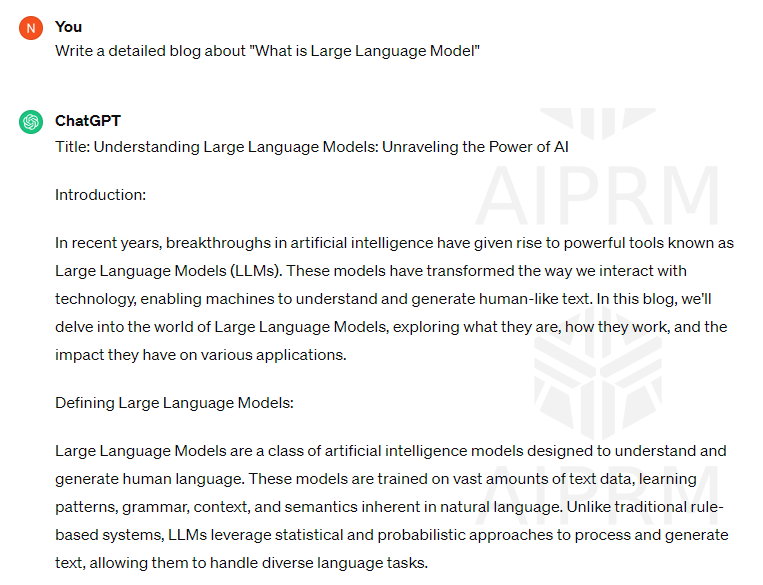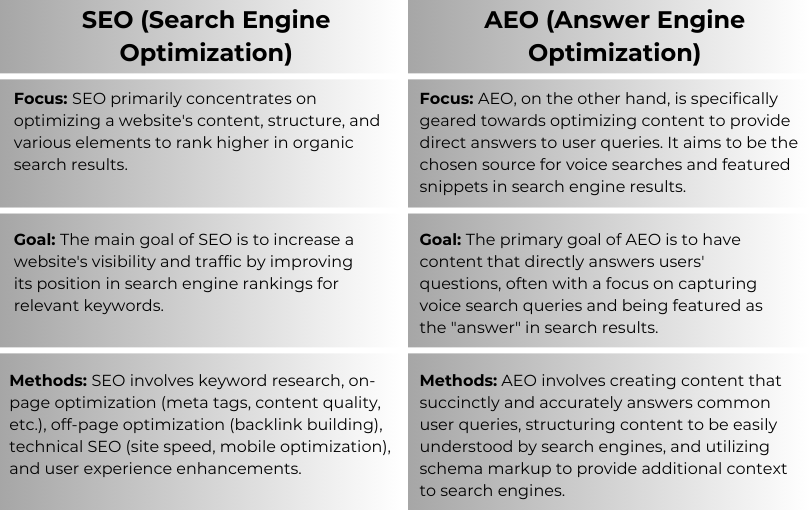From generative artificial intelligence (AI) and large language models (LLMs) to search generative experience (SGE) and zero-click searches, SEO trends for 2024 show this will be the most disruptive year yet. These will create an increasingly user-centric approach where technology and convenience come to the forefront.
Although many trends inevitably fall into oblivion, we have chosen those most likely to stick. Discussing them will help you prepare and adjust your strategies, ensuring higher ranking, traffic, and lead conversion.
The following are the most anticipated SEO trends in 2024.
1. LLMs as the First Writing Starting Point
ChatGPT arrived in late 2022 but only became a widespread tool in 2023. That trend will continue to impact content creation, especially as more people speculate when the 4.5 iteration might be available.
While it’s still uncertain whether OpenAI is working on a newer ChatGPT version, 3.5 is many people’s starting point when writing articles and blog posts. Many use it to generate quick outlines, brainstorm keywords, create topic clusters, and even write entire articles and blog posts.
Even though ChatGPT is impressive and helps streamline your SEO strategy, avoid relying solely on this tool. Whether you use the free or premium version, everyone else who provides similar prompts like you will get similar results.

AI Falls Short of Creating Original and Moving Content
ChatGPT can only write text based on its training data, often resulting in dull content, cliché phrases, and repetitiveness. Regardless of how much you adjust your instructions, you might get a similar outcome and have more work guiding this tool than you would if you wrote an article yourself.
You might wonder how ChatGPT is still among the principal SEO trends for 2024 if its output quality is not as high as we initially expected. However, many entrepreneurs, marketers, and creators based their strategies on quantity.
How to Use ChatGPT and Similar Tools Effectively
LLMs should be your little helpers instead of doing all the work. The best way to leverage this trend is to use tools like ChatGPT to be faster and more creative.
Aim for automation of tedious tasks by getting it to help you start and finish. Meanwhile, focus on the substance and the crux of your assignment.
For instance, research relevant keywords, create a working title, and prompt ChatGPT to create a detailed outline.
Write a draft and instruct AI to proofread it and check whether it’s cohesive. But remember, ChatGPT doesn’t always notice context intricacies, requiring you to be the last one to read and edit before finalizing your text.
This tool can also help write title tags and meta descriptions or simplify your snippet definitions. Beyond that, ChatGPT isn’t the best solution for writing content from scratch or generating keywords.

2. Search Generative Experience (SGE) Providing AI-Generated Results
SEO’s primary goal is to improve a website’s visibility and ranking on SERPs for relevant queries. However, due to the rise of SGE, meeting that objective could become more challenging in 2024 and beyond.
In a nutshell, SGE refers to Google’s AI-driven user search experience. Although currently available only in English and to some people in the U.S., Google will soon generate an AI result when you type a query into the search bar. Its answer will appear at the top of SERPs, concisely responding to your question.
As a helpful and clear summary of the best articles, this feature will likely become ubiquitous, transforming how users engage with search engines. That will also nudge websites to rethink their optimization strategies to keep driving traffic and impressions.
Adapting SEO Strategies for a More Interactive Search Process
They must adapt to SGE’s innovating user interactions by delivering short, direct, and straightforward responses to their search queries. This feature will also provide relevant visuals and make the search experience more conversational.
Remember, these aren’t ChatGPT but AI-generated results. Moreover, they include links to relevant sources and prompts that dive deeper into the subject.
As a result, Google will better understand your queries and offer more human-like and on-point responses. The search process will become increasingly user-friendly and interactive, with algorithms comprehending and anticipating user intent.
SGE won’t stay in the realm of ambitious ideas. The AI market will grow to nearly two trillion USD by 2030, encompassing generative AI, chatbots, research, product making, and analysis.
How to Leverage the SGE Trend for Your SEO Efforts?
Since it still isn’t globally available, there’s no definite guide or rules for optimizing content for Google’s SGE. However, the new feature suggests links to concise articles and resources.
It typically includes three sources on the snippet’s right side, but it’s unclear how the algorithm chooses those suggestions. Yet, it does seem like all the resources are:
- Analytical: So far, it looks like SGE incorporates research and information from various relevant sources to generate a helpful answer. Hence, focus your SEO strategies on offering an analysis or expert opinion on the given topic to boost the chances of SGE including your content.
- Niche: Google’s AI-generated snippets typically include websites focusing on niche and specialized industries or topics. Topical authority could be among the main goals for SGE optimization.
- Direct: AI snapshots tend to include full sections of text. Therefore, focus on writing organized bullets, blocks, and lists. That could help SGE parse, understand, and reward your content.
- Informative: The new feature seems to favor primary data sources and analysis. Prioritize novel information and studies instead of regurgitating existing content.
Although those factors should be present in your content strategy, don’t abandon your usual SEO best practices. SGE will undoubtedly impact user behavior, but traditional search results will still appear on the SERPs.
Moreover, it’s impossible to determine whether most users will find AI-generated answers enough and how many will still check the other results.
3. Answer Engine Optimization (AEO) Prioritizing Crisp and Straightforward Content
There’s no going back to the era before chatbots and AI, and users will no longer search and find information how they did before. Many are adopting the AEO approach to prepare content that can help them keep up with SEO trends for 2024 and beyond.
AEO allows you to optimize content for answer engines, the typically AI-driven tech (e.g., ChatGPT, Bing chatbot, SGE) that answers users’ conversational questions. Smart assistants, chatbots, and voice search have accelerated the search process. As a result, people often seek immediate answers and don’t want to sift through traditional search results.

How Can You Develop an AEO Strategy?
Combine your traditional SEO strategy with AEO, and keep in mind answer-based questions. Create direct, unambiguous, and concise content that machine learning and AI algorithms can ingest and cite in their responses.
Consider introducing a format prioritizing Q&A style, such as FAQs. You can also write long-form content centering around scenarios and queries people often use in conversational search. For instance, you can research long-tail questions and common queries relevant to your business or industry.
That can be your content strategy’s guide and increase your content visibility. Remember, create content that answers common inquiries, use a snippet-friendly format (e.g., short paragraphs), and implement Schema markup to ensure search engines comprehend your page’s content.
4. Adapt to Zero-Click Searches
According to SEMrush, 57 percent of mobile and over 45 percent of desktop searches leave the SERP without going through the web page or clicking on a paid or organic result. These users don’t click on any suggested link for various reasons.
For example, they might have looked for a local service or business, which Google typically offers in the map pack. Or a user may have asked for information on a public figure and got all they needed from the knowledge panel.
Thanks to Google immediately meeting the user intent by providing concise responses in a local pack or similar feature, many searches will yield zero clicks.

How to Reduce the Blow of Zero-Click Searches?
The best approach is to aim for a featured snippet for common questions that don’t lead to users having to click on search results. In this case, definitions and informational keywords are the most likely not to require clicking on a web page.
However, that doesn’t mean you’ll inherently get more traffic if you target those queries. But securing the position zero and having texts appear as featured snippets gives you an advantage.
You will boost the odds of getting more clicks and more people noticing your brand. That approach could help you position yourself as a thought leader in your industry, encouraging users to check your website in future searches.
Reinforce Your Strategy with a Thorough Assessment
A SERP analysis will help you understand the queries yielding answers as definition snippets. Targeting those keywords should be your objective. However, when doing so, consider link-building and optimizing for both local and international SEO. That will help you reinforce your credibility and connect with your regional audience while acknowledging the global market.
That often requires extensive effort and planning. Hence, you may consider professional SEO services that can boost your SERPS rankings and drive traffic while including SEO trends in your content strategy.
FAQs
Does SEO Have a Future?
Yes, SEO has a future despite many people wondering whether SEO will exist in five years. The changes in technology acceleration, user behavior, and search engines will impact its further development, but SEO will stay relevant.
However, content optimization will always require new strategies to stay ahead of the fast-transforming user preferences and search engine algorithms.
Will Generative AI kill SEO?
Generative AI won’t kill SEO but push it to evolve and adapt. SEO professionals must be resilient and flexible and use AI to streamline manual tasks, optimize content, and develop more effective strategies.
How to Find Trending SEO Keywords?
To find trending SEO keywords in 2024, SEO professionals can leverage tools like Google Trends, Ahrefs, or SEMrush to analyze search volume, identify emerging topics, and gauge keyword popularity. They can also stay informed through industry publications, forums, and social media discussions that offer valuable insights into current and anticipated trends.
How to Keep Up with SEO Trends?
Following reputable industry blogs, attending webinars, and participating in online communities where professionals discuss the latest developments can help anticipate SEO trends. Tools such as Moz’s “Whiteboard Friday” and Search Engine Land’s “SearchCap” can provide in-depth insights and analysis on evolving SEO trends.





